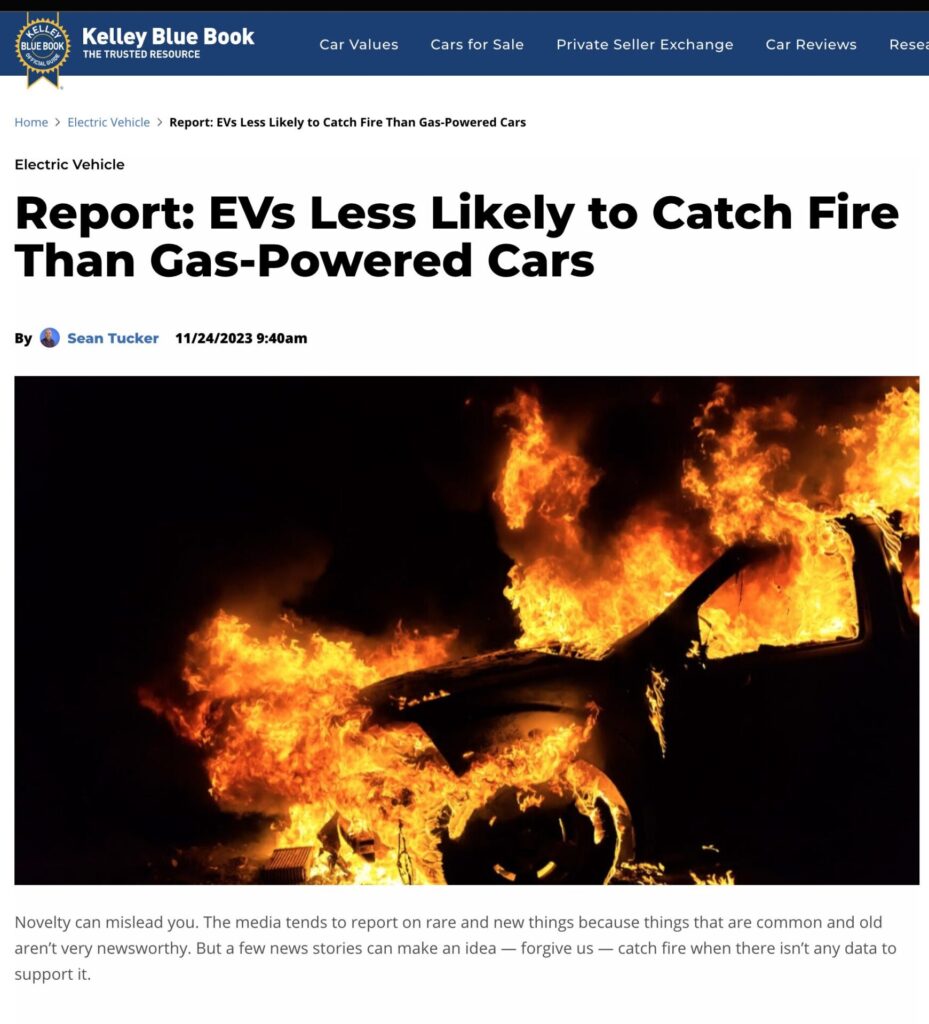
Despite the occasional headline about electric vehicle (EV) fires, data consistently shows that EVs are significantly less likely to catch fire than gasoline-powered cars. Several studies from around the world have confirmed that the fire risk for EVs is far lower than for vehicles using internal combustion engines (ICEs). This often surprises consumers, as media coverage tends to exaggerate the dangers of EV fires when they do happen.
A study from AutoInsuranceEZ found that gas-powered cars are about ten times more likely to catch fire than electric vehicles. Their data showed that for every 100,000 sales, there were 1,529 fires in gasoline cars, compared to just 25 in electric vehicles. Hybrid cars, which use both gasoline and batteries, had an even higher rate of 3,475 fires per 100,000 sales(Kbb.com)(Electrek).


Supporting these findings, data from the National Fire Protection Association (NFPA) revealed that vehicle fires, largely involving gas-powered cars, accounted for 15% of all fires in the U.S. in 2020. This translated to over 215,000 vehicle fires that year, with only a fraction involving EVs(Electrek). Similarly, a report from Norway’s Directorate for Social Security and Emergency Preparedness found four to five times more fires in petrol and diesel cars compared to electric cars(Kbb.com)(InsideHook).

One of the key reasons for this discrepancy is the fundamental nature of the vehicles themselves. Gasoline is highly flammable, and internal combustion engines rely on controlled explosions to function. If something goes wrong, it can lead to a fire. EVs, on the other hand, do not rely on combustion, and while their batteries can ignite under specific conditions—such as severe crashes or manufacturing defects—these incidents are rare and usually well-contained(Kbb.com)(CleanTechnica).
Some skepticism about EV safety persists, partly because EV fires, when they do occur, can be more difficult to extinguish due to the nature of lithium-ion battery fires. These fires can burn hotter and longer than gasoline fires, but such events remain uncommon. According to the Insurance Institute for Highway Safety (IIHS), no EV has ever caught fire during their crash tests, further reinforcing the safety record of electric cars(CleanTechnica)(InsideHook).

Public perception is also skewed by the way media covers these incidents. EV fires, although rare, tend to make headlines, while the far more common fires in gasoline vehicles receive little attention. As electric vehicles become more prevalent, it’s important for consumers to understand that the overall risk of fire in these vehicles is much lower than in traditional gas-powered cars(Kbb.com).
When it comes to media coverage of vehicle fires, electric vehicles (EVs) tend to dominate headlines far more than gasoline-powered cars . However, the reality is that gasoline cars are significantly more prone to catching fire. In 2020 alone, there were over 200,000 gas vehicle fires in the U.S., while there were only 52 fires involving electric cars(Electrek)(electrive.com).
Despite these figures, gas car fires rarely make the news, while EV fires often grab attention due to their novelty. Electric cars represent a relatively new technology, and any incident involving them tends to be viewed as a significant event. This leads to a disproportionate number of media stories about EV fires compared to the actual frequency of these incidents
.
For instance,
according to a report by AutoInsuranceEZ, gas-powered cars are about 60 times more likely to catch fire than electric vehicles, yet the media tends to focus more on the latter(Electrek).

Part of the reason is psychological—gas car fires are seen as routine, but because electric vehicles are new, their fires are viewed as more unusual and, therefore, more newsworthy (
Electrek)(electrive.com). This discrepancy in media attention creates the false impression that EVs are more dangerous, even though they are statistically much safer when it comes to fire risks.
Some use cases still exist where EV’s are not the best solution, but this fact-based argument should remove the last psychological barriers many have against switching to an electric vehicle even though doing so is [usually] in their best interest.






